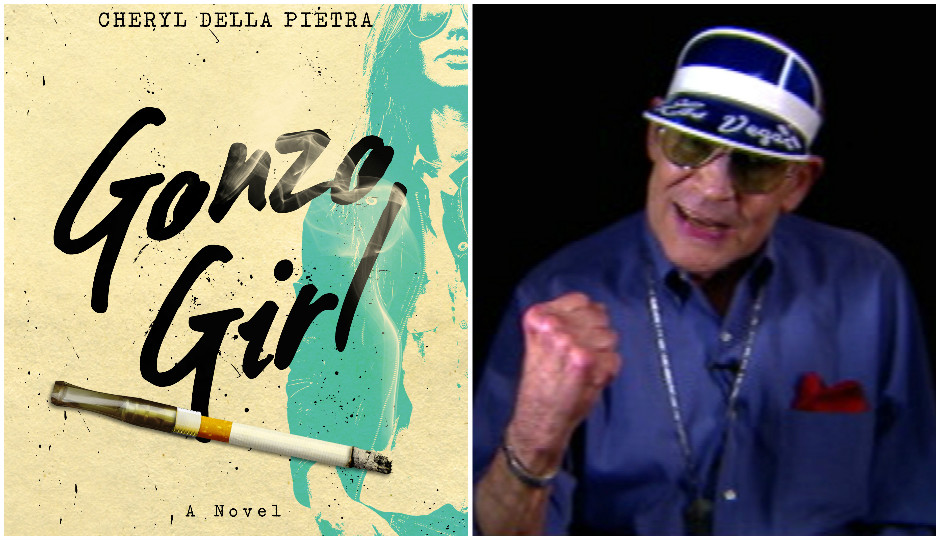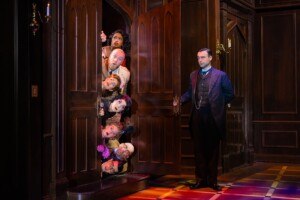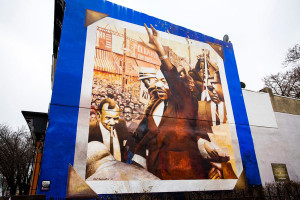Hunter S. Thompson’s Former Assistant Tells Wild Stories in New Book

Photo of Hunter S. Thompson from Wikimedia Commons
The contrast is difficult to get my brain around. I’m talking with the well-mannered and apparently highly responsible Cheryl Della Pietra, who at 46, is a mom, wife, writer, copy editor at Us Weekly, Penn grad, and (full disclosure) former Philadelphia magazine intern. She’s so nice. But the stories she’s telling me are so naughty. It’s hard to believe that this novelist is the same woman who made a drug buy for cultural icon and creator of “gonzo” immersive journalism, Hunter S. Thompson, her boss for five months back in 1992. Della Pietra also romanced a Hollywood A-list actor, shot pistols with Thompson while high, consumed staggering amounts of cocaine, shrooms, and other illicit drugs, not to mention drinking enough alcohol to drown a sailor.
Gonzo Girl (Simon and Schuster/Touchstone) opens with a tense scene during her actual weekend “try-out” when she visited Thompson at his ranch outside Aspen, Colorado. You know you’re in for a delectably bad-behaviored tale with phrases such as: “The tray of coke never really settles on the table. It just keeps getting passed around like it’s crowdsurfing at a Hole concert,” and “Despite the substances and the guns, I’ve never felt unsafe. Until this moment.”
But yes, it’s all there in the Connecticut-based author’s first novel, which chronicles the adventures of her first literary job out of college. She’ll be reading from it at St. Joseph’s University on October 27th at 6:30 pm, and Barnes & Noble, Rittenhouse Square on October 29th at 7 pm.

Author Cheryl Della Pietra | Photo by Helen Barnard
How did you get the job to be Hunter S. Thompson’s editorial assistant?
I was a recent graduate and moved to New York to get into magazines. What I ended up doing mostly was tending bar and doing a couple fact-checking gigs. A friend of mine who was an intern at Rolling Stone, called me and said Hunter S. Thompson is looking for an assistant and do you want to throw your hat in the ring. I said ‘Why aren’t you?’ He said, because he wants a girl. I worked up a letter for him that day, faxed it and he called me at 3 o’clock in the morning. He said ‘I liked your letter. Can you get out here tomorrow?’ I flew out the next day. I wasn’t leaving anything so maybe it was a blessing in disguise that I was having bad luck finding a job. So I went out there and had this three-day trial period and he said I could stay.
After reading the book, I kept thinking how brave you were. How close is the book to your actual experience?
Certainly all the drugs are true, not a lick of that is embellished. People have a hard time believing what he was capable of in that realm, but he did all those drugs. [laughs]. I don’t know if it was bravery as much as utter naiveté. Thinking back to my 22-year-old self, I had some ambition and probably thought this could get me to a place where I wanted to go.
As I was reading, it felt like your character kept making bargains with herself to justify the risks she was taking.
It didn’t feel all that well thought out. There was definitely a point where I was running on fumes, and just getting through the day. The reason I waited so long to write this book — it’s been 23 or 24 years now — was because I just didn’t have a grasp of it in the moment. It wasn’t until I had the hindsight of an adult that I could even really understand what I went through up there and what it meant to me.
What did it mean to you?
There was this person, Hunter S. Thompson, whom I admired very much, but I was definitely there on the backside of his career, and he was struggling a little bit. The book portrays this kind of person in the twilight of his career. I have a lot of sympathy for that now. I know how hard it is to get up and try to put something on the page every day. But the fact that he fought the good fight every day on a number of levels, personally, professionally, I really admired that. He taught me a lot about fun and all of the stuff that he did, people see it on the face as some kind of nonsense, but I think this is what fueled his creative spark. We can forget that about creative people, but to have fun every day can lay this foundation for creativity and originality. I’m more of a grinder. I stare at the page and will it to happen. He did all this stuff before he sat down to write. A lot happened between 3 pm and 2 am, when he actually sat down at the typewriter.
He must have been thrilled to see on your resumé that you were a bartender.
He was. I included it in my letter, trying to stand apart. I have this education but I have smarts behind me, and I knew how to make a drink and have a good time. I thought these would all work in my favor.
What was his drink of choice?
Chivas and water was his all-day drink, but he certainly didn’t discriminate against other drinks.
Why not a memoir?
As a former fact-checker you have to be true to events, and I was too far away from it to make it the 100-percent truth. I wanted to give myself the freedom to say what I wanted to say about the experience rather than narrowly set forth events. I might add that nothing was particularly linear either.
You seem well equipped to deal with this lion of the literary world screaming at you. That would be very intimidating for a lot of people.
It was very nerve-jangling when it happened. I wasn’t cool about that. Sometimes we’d get into raging arguments over nothing. He definitely had very big mood swings. Things could fall apart very quickly over little or nothing … I was very much alone with those anxieties and fears, but that contributed a little bit to why I left … too much on top of too much on top of too much.
What did Thompson say when you finally left?
We parted on excellent terms. I wasn’t the first assistant to ever leave there. He totally got it. On my last day there, we went to a party in Denver at his lawyer’s house and we ended up in a swimming pool completely clothed. I don’t know who pushed whom in but it was a fun ending. I was flying out of Denver, and Hunter was staying at the party and then flying back to Aspen. When I got into the limo to go to the airport, I realized I was sitting on his hat, that Tilley hat that he always wore and was famous for.

Cheryl Della Pietra holding Thompson’s hat. | Photo by Helen Barnard
Did he leave it on purpose?
It’s kind of like when you leave your cell phone at the guy’s house. I don’t know if it was intentional like that, maybe subconsciously. I’m glad that I have it. It means a great deal to me. The other thing is when I came back East I worked on an outline for another book for him. It was called 99 Days, the working title, but it was never published. I worked on that for a month and sent it back to him.
Did you ever see him again?
The last time I saw him was in 1998 when he was doing a reading at Union Square Barnes & Noble for The Rum Diaries. [Thompson committed suicide with a gun in 2005.] I went with my now husband, who was my boyfriend then. We both bought our books and stood in line like everybody else, but when we got to the front of the line, he looks at me and grabs me — and this is six years after I’d left — and he pulls me over the table and starts giving me a noogie. Then he said ‘Stay over there! You’re coming out with us tonight.’ We went out later with him, his wife, Benicio Del Toro, and a bunch of people. That was the last time I saw him.
What’s your favorite article or book of his?
Fear and Loathing in Las Vegas is the obvious answer. Everybody should read that. But after that my next favorite is Fear and Loathing: On the Campaign Trail ’72. I love his political writing so much. It’s a wonderful piece of writing and he was finding his voice both in terms of his political analysis, and the original spark. You feel it all starting to come together there. I love that book so much.
Are you enjoying the book readings?
I enjoy doing these kind of things and have the freedom as a freelancer to devote the time and resources to it. In November last year I was diagnosed with lymphoma. It was the most up-and-down, craziest year of my life, but it did put things into perspective. I have a clean bill of health now. I think, ‘Now enjoy this Cheryl, this is what you’ve been working for your whole life.’


